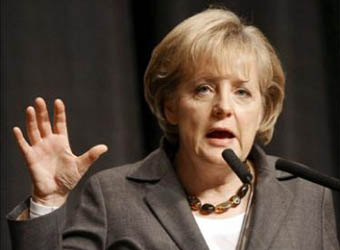German Chancellor Angela Merkel told her European Union partners it’s business as usual again as she returned to the international stage and the Social Democratic opposition leader opened the door to a governing coalition for the bloc’s biggest economy.
Pressure has been mounting on SPD head Martin Schulz to drop his opposition to an alliance with Merkel, after her efforts to form a government with three other parties collapsed on Sunday, raising the prospect of an unprecedented repeat election and months of political drift in Europe’s biggest economy.
Schulz backed off his flat refusal to consider a renewed “grand coalition” with Merkel’s Christian Democrat-led bloc, saying that the SPD “won’t play an obstructionist role” in parliament, though he insisted party members will have the final say on any deal. It could be the first step toward rejoining Merkel as junior partner in a government, the combination that’s underpinned two of her three terms over the last 12 years.
After canceling a planned meeting Monday in Berlin with Dutch Prime Minister Mark Rutte and skipping an EU summit in Gothenburg, Sweden last week, Merkel traveled to Brussels Friday for a summit of EU leaders and partners from Eastern Europe. Next week, she heads to Ivory Coast for an EU summit with African countries.
European Union partners it’s business as usual again as she returned to the international stage and the Social Dmocratic oppotion leader opened the door to a governing coalition for the bloc’s biggest ePressure has been mounting on SPD head Martinto drop his opposition to an alliance with Merkel, after her efforts to form a government with three other parties collapsed on Sunday, raising the prospect of an unprecedented repeat election and months of political drift in Europe’s biggest economy.
After canceling a planned meeting Monday in Berlin with Dutch Prime Minister Mark Rutte and skipping an EU summit in Gothenburg, Sweden last week, Merkel traveled to Brussels Friday for a summit of EU leaders and partners from Eastern Europe. Next week, she heads to Ivory Coast for an EU summit with African countries.
Currently governing in a caretaker capacity, the chancellor said she had been asked by EU colleagues about the political situation in Berlin and had sought to reassure them: “I was able to tell them that we, as the acting German government, will fully fulfill our European obligations and that we will actively engage,” Merkel said in a statement to reporters, adding that her comments had been well received.
Two months after an inconclusive election that sent the chancellor’s CDU-CSU bloc and the Social Democrats to historic lows, Merkel is still trying to work out how she can govern.
Markets have taken the uncertainty in stride. The euro rose 0.65 percent to $1.1928 at 4:10 p.m. in Frankfurt, gaining for a fourth day after the breakdown of coalition talks caused its biggest drop in almost a month. Germany’s benchmark DAX index of leading stocks extended gains and the Ifo institute’s German business confidence index climbed to a record.
Strong Economy
“Most companies think that in the next weeks or months there will be a government so the economy is strong,” Ifo president Clemens Fuest said in a Bloomberg Radio interview on Friday. “Demand is strong and so far this political uncertainty doesn’t affect the economy.”
Schulz’s latest comments appear to narrow the gap between him and Merkel, who says she’s skeptical about governing without a majority and relying on parties outside her government to help pass legislation. That’s all Schulz has offered until now, though on Friday he didn’t mention his earlier rejections of forming a government with her.
“We are not going to go automatically in any direction,” Schulz told reporters at party headquarters in Berlin. “Only one thing is already completely clear: If talks lead to us taking part in government, in whatever form that might be, the members of our party will vote on it.”
President Frank-Walter Steinmeier will host Merkel and Schulz for talks Thursday at 8 p.m. local time as she seeks to secure her fourth term.
SPD Split
Any coalition talks with Merkel’s group would be likely to take weeks, followed by a membership ballot, which the Social Democrats also held before entering Merkel’s last government in 2013. Some form of preliminary decision might come at a previously scheduled SPD convention in Berlin from Dec. 7 to Dec. 9 to elect party leaders.
As they prepare to engage with Merkel, the Social Democrats are split between those on the left who see the two coalitions with Merkel as the main reason for the slump in its support and those who spy a chance to push through policies such as expanded health care and reaching out to French President Emmanuel Macron to strengthen the euro area.
Many in the SPD would prefer to stay out of government to prevent the far-right Alternative for Germany, which entered parliament for the first time with 12.6 percent of the vote in September, from becoming the biggest opposition force.
Manuela Schwesig, the SPD premier in the eastern state of Mecklenburg-Western Pomerania, said the party’s willingness to talk didn’t pre-empt the outcome.
“Just because we’re saying that we’re open to talks, it’s not automatically a discussion about a grand coalition, and certainly not a vote for a grand coalition,” she said on ZDF television.
source: Bloomberg
